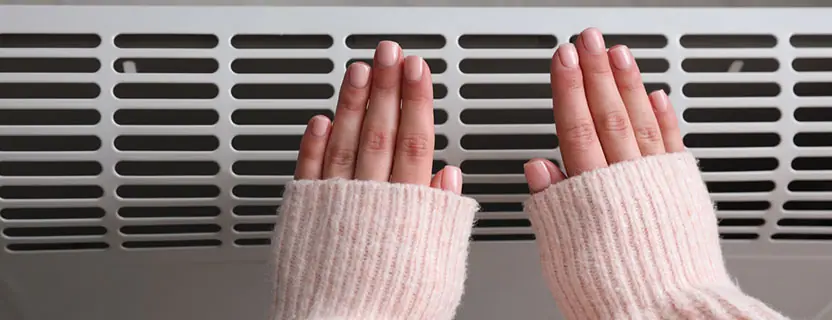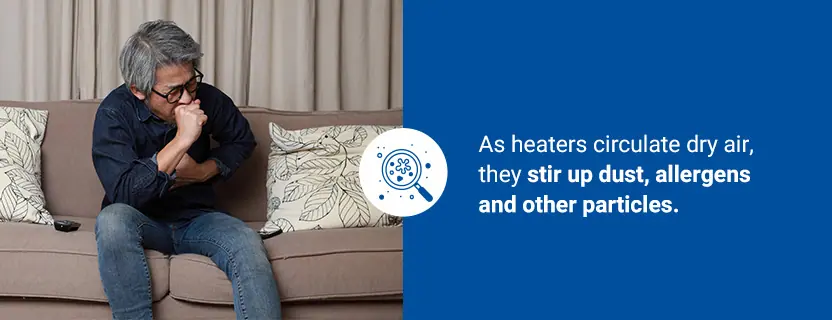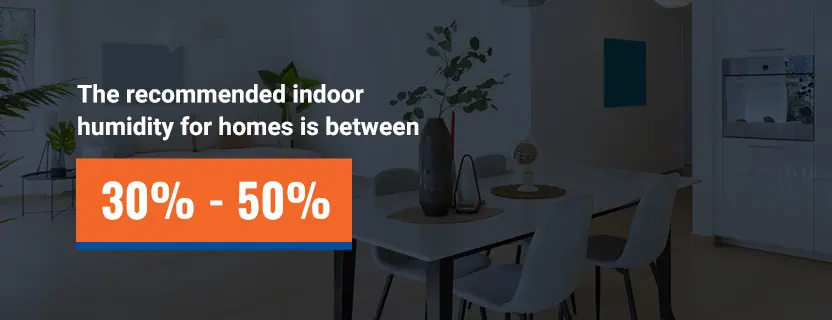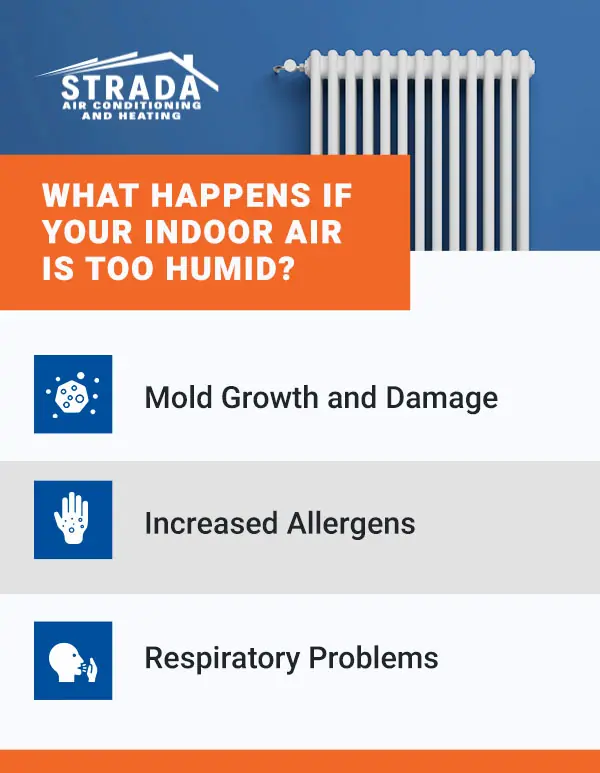
Even in sunny Florida, winter temperatures can get uncomfortably cold. When the outside heat drops, you turn on your home heater.
While your home might be warm, you could start experiencing dry skin and unexpected nose bleeds. But where does this dryness come from, and how can you prevent it? When you understand home heating and hydration, you can prevent dryness while staying comfortable all winter long.
Cold weather brings more than low temperatures — it actually affects how much water the air can hold. The colder it is, the less water the air can hold, which means a lower humidity. The outside air is already drier in the winter, and your home heater only adds to that.
Heaters keep your house warm, but they don’t add moisture. They only heat your home’s existing air. So, if your home air is dry thanks to the winter weather, your heater is just going to warm that already dry air, further reducing humidity. While too much humidity is bad for your home, too little can affect your comfort. Here’s how heaters dry out your home:
There’s more to heaters than just dry air. The effects of heaters on air quality mean you need to give your system some extra attention to protect your indoor air. As heaters circulate dry air, they stir up dust, allergens and other particles. Dirty filters and low humidity can make it easier for contaminants to spread. You could irritate your respiratory system and increase cold-like symptoms. Use high-quality air filters and humidity monitoring to protect your health.

Dry air is uncomfortable but can affect your health, too. With the heating running continuously during winter, you might start to see your skin dry out and other health issues. When indoor air lacks moisture, it can lead to these problems:
Prolonged exposure to dry air draws the moisture out of your skin. Your skin and mucous membranes rely on moisture to maintain their health. You could get dry skin, cracked lips and nosebleeds. You might even start to have itchy eyes if the dryness is severe enough. While these problems can be mild, severe skin cracks and slow healing can make you vulnerable to infections, risking your health further.
Your nose and mucus are one of the first lines of defense against viruses. Mucus and nose hairs catch dust, allergens and even viruses, preventing them from getting inside your body. But when viruses get past your mucus, it’s up to your immune system to stop them before they affect your body. Cold weather can actually slow down your microscopic defenders, making it easier for illnesses to take root and make you sick.
Dry air can also inflame your respiratory system. Breathing in dry air makes respiratory conditions like asthma and infections like COVID-19 worse. If you have allergies or respiratory difficulties, dry air can make them worse. When dry air inflames your nose and throat, breathing can be harder. Inflammation can also make you wheeze and cough, increasing discomfort.
Even people without these conditions can experience respiratory issues. An inflamed nose and throat closes up your airways, making breathing difficult and causing congestion. You could be battling cold-like symptoms at home without a cold.
While dryness is uncomfortable, it’s not always noticeable at first. However, your body and home will start showing signs when the humidity drops too low. Once you recognize the signs, you can start preventing dry skin in winter.
Fighting dryness means taking the right precautions during winter. While moisturizing helps your skin, moisture-retention strategies can do more to fight off discomfort. Use these tips to keep your humidity and comfort up during cold snaps:
Humidifiers are your first and best defense against dryness. They’re specifically designed to raise indoor humidity levels. Humidifiers work by releasing water vapor into the air, increasing moisture levels so you can stay comfortable.
While smaller humidifiers are available, they can only help one room at a time. You have to physically move them to where you want humidity. Portable humidifiers can help, but they need constant refilling, regular maintenance and distilled water to work. You’ll be cleaning and refilling every time the humidity drops.
Instead, consider working with professionals to install a whole-house humidification system. These systems connect to your existing heating and cooling system, using your water supply to create moisture. When your heat or air conditioning runs, it automatically sends water vapor into the air, keeping humidity levels stable. With whole-home systems, you get hands-off humidity for your entire house and built-in humidity monitoring.
If you want more natural ways to add humidity, you’ll have to break out the bowls. Many people might want to use plants to increase humidity. However, you’d need a lot of plants close together to have a noticeable effect. Instead, you can try placing bowls or buckets of water around your home. With the heat up, you can encourage evaporation and add moisture to the air.
The faster but less hands-off method is boiling water on the stove. You won’t reduce your energy use, but you can raise the humidity near the kitchen. Fill your biggest pot with water and boil it on the stove. This sends lots of moisture into the air much faster than natural evaporation. To spread the vapor away from your cabinets, place a fan nearby. As the water boils, the fan will send the vapor out into the room, creating a humid central space.
You can also make your daily activities part of your humidity-boosting routine. Small changes can go a long way when it comes to indoor moisture, like:
Part of preventing dryness is monitoring humidity levels. Increasing humidity is essential in winter, but too much humidity can damage your home. In the long term, mold growth and furniture damage could occur. You need humidity monitoring tools to keep your home’s moisture in check.

The recommended indoor humidity for homes is between 30% and 50%. This range is high enough to protect your health while avoiding mold and excess moisture. Once you hit 50%, you may notice sticky floors and fog on the windows. This is your sign to reduce the humidity before you encourage mildew.
If you’re unsure about your humidity levels, invest in a hygrometer to measure indoor humidity. These devices can help you track indoor humidity and adjust moisture levels as needed.
Drafty windows and doors let your warm air out and allow cold, dry air to take its place inside. Seal your home against sneaky cold air to protect your humidity. Go over door gaps, window frames and other exterior-facing areas to close any cracks or gaps. With caulk and weatherstripping, you can stop your comfortable air from getting outside. As a bonus, your heating, ventilation and air conditioning (HVAC) system will work more efficiently, too.
Some HVAC systems have dehumidifiers. They’re designed to protect your home from moisture, but they can also work too well. If you can turn off this feature, do so in the winter to preserve moisture levels.
Your home also features many appliances that can dehumidify your space. Ovens, exhaust fans and dryers can all remove moisture from the air. To maintain humidity, avoid using these during the driest, coldest times. Watch your humidity levels and only dehumidify when needed.
Florida is well-known for its high humidity. Being right next to the ocean means dealing with extremely high humidity. This moisture is less of an issue in the winter, but you still need to keep an eye out. As mentioned, cranking up your humidifiers for winter or running extra-long showers can create excess moisture inside. Here are some of the year-round humidity concerns for Florida homeowners:

Excessive indoor humidity creates the perfect conditions for mold growth. Mold loves moisture — it thrives when water levels rise in poorly ventilated areas like bathrooms, kitchens and basements. It can quickly spread to carpets, walls and ceilings, damaging your home’s structure.
Mold isn’t just an eyesore — it’s a serious health risk. It releases spores into the air, which can trigger respiratory issues, especially in people with respiratory conditions. Over time, prolonged exposure can cause severe health concerns, like sinus infections and lung irritation. Control humidity levels to keep your mold risk down.
Dust mites can also pop up in high-humidity homes. These microscopic creatures love moist environments and multiply quickly in your home. Dust mites contribute to allergy symptoms like sneezing, itchy eyes and asthma flare-ups. If you’re noticing extra sneezing around the house, your humidity levels could be encouraging dust mite growth.
Breathing in too-humid air can feel heavy and uncomfortable. High humidity means more moisture in the air, so you get less air with each breath than normal. Leaving the humidity too high can also affect your breathing if you have respiratory conditions.
Additionally, viruses and bacteria love growing in warm, moist conditions. You could be making your home a large petri dish, encouraging infections in your household. Reduce your risk of illness with humidity monitoring.

Dry air can affect your skin and health, making it hard to relax at home. If you’ve noticed dry skin, irritation or extra static electricity, it’s time to address your indoor humidity levels. Strada Air Conditioning & Heating offers whole-home solutions to help Florida homeowners manage their air quality. With our expert services, you can get year-round indoor comfort.
We’ll install humidifier systems, air filters and purification systems to keep your home comfortable and healthy. These solutions combat airborne contaminants, protecting your Florida home from common pollutants. We also offer comprehensive heating and air conditioning services. Trust Strada Services for all your home heating and cooling needs.
Call us at (865) 424-7277 or contact us online to schedule your appointment today!